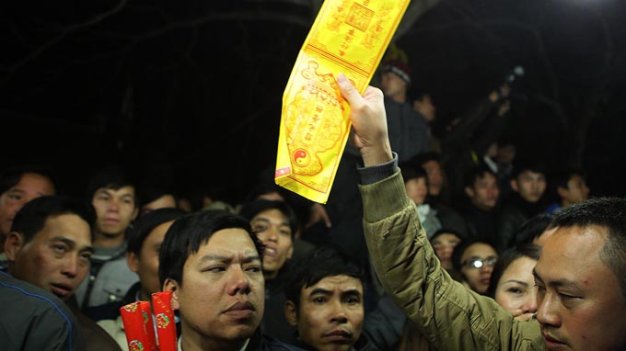Though many northern provinces hold ceremonies to grant symbolic copies of certain Vietnamese feudal kings’ seals, believed to bring fortune to recipients, one local archaeologist has asserted that these ceremonies are historically groundless.
The rites, primarily held in northern localities, normally see thousands of pilgrims elbowing their way through overflowing crowds simply to receive a symbolic ‘royal seal,’ – a simple yellow paper printed with symbols and Chinese text in red ink.
Though the ‘king’s seals’ are printed en masse by the festival organizers, people religiously believe that these thin sheets of paper will ensure them a year full of luck, fortune, and health, and that all their wishes and desires will come true.
Contrary to their belief, in a piece sent to Tuoi Tre (Youth) newspaper, archaeologist Nguyen Hong Kien, PhD, says that there is no historical ground to hold a ‘king’s seal issuing rite,’ and these ceremonies are “distort history.”
According to Dr. Kien, one of the first king’s seal granting rites was held in the Tuc Mac village in the northern province of Nam Dinh.
The rite was initially an activity practiced within the village boundaries, using the seal of kings from the Tran Dynasty in the 13rd century.
However, the Tuc Mac rite was later ‘accepted’ by Vietnamese throughout the country as a national-level festival, attracting pilgrims from other localities and prompting other provinces to hold similar festivals.
“‘Tran Kings’ seals’ are now issued at festivals in Ha Nam, Thai Binh and Quang Ninh provinces, as well as in the Thang Long Citadel in Hanoi,” Kien wrote.
“As an archeologist, I can confirm that, none of the ‘king’s seals’ being issued and festivals being held has a single piece of historical ground,” he underlined.
 A man happily showcases a 'Tran King's seal' in Hanoi.
A man happily showcases a 'Tran King's seal' in Hanoi.
Distortion of history
According to Dr. Kien, during the Nguyen Dynasty (1802-1945), temples throughout northern Vietnam claimed that they were the ‘sole authentic’ worshipping place for the Tran Kings.
To combat these claims, Tuc Mac, the arguably recognized Tran King worshiping area, came up with the king’s seal issuing ritual.
At first, only ten Tran King’s seals were issued to villagers at each festival in Tuc Mac, but that soon changed as people began believing that the symbolic seals could help them with job promotion and business, according to the archaeologist.
In the last few years, the ‘seals of the Tran Dynasty’ have been granted during a national-level festival in Nam Dinh in the middle of the first lunar year.
“At a scientific conference in 2011 about this festival, I delivered a discourse asserting that the fest is a distortion of history and received no defense from other participants,” Kien said.
As for the similar festival held at Tran Thuong Temple in Ha Nam Province, Kien said the rite “is a product of mere imagination.”
“Legend has it that the temple is built on land where the Tran Dynasty built their food reserves, but it is illogical to say that the kings also kept their seals among the rice and corn,” Kien explained.
 People jostle to grab the 'king's seal'
People jostle to grab the 'king's seal'
According to the archaeologist, the festival to issue the seals of the Tran Dynasty at the Tran Tam Duong temple in Thai Binh Province is “based on neither legend nor myth, let alone historical grounds.”
“The seal used at the temple is in fact an artificial product ‘donated’ by a local business, and the culture ministry has confirmed that it is a bogus royal seal,” Kien said.
The expert continued pointing out that the seal used at the festival in the Bai Tho (Poem) Mountain in Quang Ninh is also fake.
“The seal was first made from wood, and later from bronze, with the carved text containing many mistakes,” he said.
Finally, the pilot festival to issue the Tran Dynasty seals at the Thang Long Citadel is also historically baseless because “the seal being used has been identified by numerous researchers as being anything but a king’s insignia.”
Like us on Facebook or follow us on Twitter to get the latest news about Vietnam!






















































